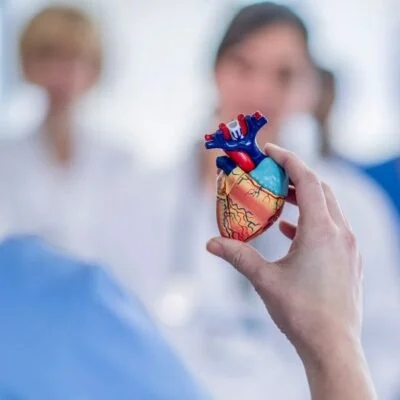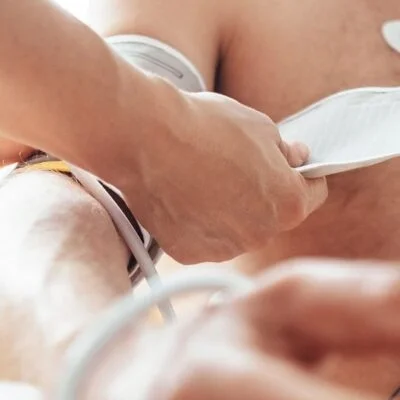Cardiovascular surgery, also known as cardiac surgery, is a specialized field of medicine that deals with surgical procedures involving the heart and blood vessels. It focuses on diagnosing, treating, and managing conditions affecting the cardiovascular system. The cardiovascular system includes the heart, blood vessels, and circulation.
Cardiovascular surgery is performed to address a variety of heart and vascular conditions, including:
- Coronary artery disease: Procedures such as coronary artery bypass grafting (CABG) are performed to bypass blocked or narrowed coronary arteries, restoring blood flow to the heart muscle.
- Heart valve disease: Surgical interventions may involve repairing or replacing damaged or diseased heart valves, which can restore proper blood flow and improve heart function.
- Congenital heart defects: These are abnormalities in the structure of the heart present at birth. Surgical procedures can correct these defects and improve heart function.
- Aortic aneurysm: Surgery may be performed to repair or replace a weakened or bulging section of the aorta, the main artery that carries blood from the heart to the body.
- Arrhythmias: Some heart rhythm abnormalities may require surgical treatment, such as implantation of pacemakers or implantable cardioverter-defibrillators (ICDs) to regulate and stabilize the heart’s electrical activity.
During cardiovascular surgery, highly skilled cardiothoracic surgeons use specialized techniques and equipment to perform the procedures. The surgery may involve opening the chest (open-heart surgery) or may be performed through minimally invasive techniques, such as robotic-assisted surgery or catheter-based procedures.
Postoperative care is essential for successful recovery. Patients are closely monitored in the intensive care unit (ICU) or cardiac care unit (CCU) after surgery. They receive appropriate medications, pain management, and supportive care to ensure proper healing and reduce the risk of complications. Cardiac rehabilitation and follow-up visits are also an integral part of the recovery process to optimize long-term outcomes and overall cardiovascular health.
Cardiovascular surgery plays a critical role in treating complex heart and vascular conditions, helping patients improve their quality of life and, in some cases, even saving lives.
How is cardiovascular surgery done?
Cardiovascular surgery, also known as cardiac surgery, encompasses a range of procedures that are performed to treat conditions affecting the heart and blood vessels. The specific technique used in cardiovascular surgery depends on the nature of the condition being treated. Here is a general overview of how cardiovascular surgery is typically performed:
- Anesthesia: The patient is placed under general anesthesia, which ensures that they are unconscious and pain-free throughout the procedure.
- Incision: A surgical incision is made to gain access to the heart and blood vessels. The location and size of the incision depend on the specific procedure being performed. Minimally invasive techniques may involve smaller incisions and the use of specialized instruments and cameras.
- Cardiopulmonary bypass: In many cardiovascular surgeries, a heart-lung machine is used to temporarily take over the function of the heart and lungs. The blood is diverted through the machine, which oxygenates it and pumps it back into the body. This allows the surgeon to operate on a still, bloodless heart.
- Procedure: The surgeon performs the necessary steps to address the specific condition. This can involve repairing or replacing heart valves, bypassing blocked coronary arteries, removing blockages or plaque from blood vessels, or repairing structural abnormalities in the heart. The surgeon may use techniques such as suturing, grafting, or implanting medical devices, depending on the procedure.
- Wound closure: Once the procedure is completed, the surgeon carefully closes the incision using sutures or staples. This step aims to achieve proper wound healing and minimize scarring.
- Postoperative care: After surgery, the patient is transferred to the intensive care unit (ICU) or cardiac care unit (CCU) for close monitoring. The medical team manages pain, monitors vital signs, administers medications, and ensures a smooth recovery. Physical therapy and cardiac rehabilitation are often recommended to aid in the patient’s recovery and improve cardiovascular function.
It’s important to note that the details of each cardiovascular surgery can vary significantly depending on the specific procedure being performed and the patient’s condition. Highly skilled cardiothoracic surgeons use advanced techniques and technologies to ensure the best possible outcomes for their patients.
What should be considered after cardiovascular surgery?
After cardiovascular surgery, there are several important considerations for a successful recovery and optimal outcomes:
- Postoperative care: Following the surgery, you will be closely monitored in the intensive care unit (ICU) or cardiac care unit (CCU) before being transferred to a regular hospital room. The medical team will provide pain management, administer medications, and monitor your vital signs.
- Wound care: Proper care of the surgical incision is crucial to prevent infection and promote healing. Follow your surgeon’s instructions on how to clean and dress the incision site. Report any signs of infection, such as redness, swelling, or drainage, to your healthcare provider.
- Physical activity: Gradual increase in physical activity is essential for a safe and successful recovery. Engage in prescribed exercises or cardiac rehabilitation programs to improve strength, endurance, and overall cardiovascular health. However, it is important to follow the activity restrictions given by your surgeon and avoid overexertion.
- Medication management: Take prescribed medications as instructed, including pain medications, antibiotics, and blood thinners, if prescribed. Monitor your medication schedule and inform your healthcare provider of any side effects or concerns.
- Lifestyle modifications: Follow a heart-healthy lifestyle by adopting a balanced diet, maintaining a healthy weight, managing stress, quitting smoking, and controlling other risk factors such as high blood pressure or diabetes. Your healthcare provider can provide guidance on specific lifestyle changes based on your condition.
- Follow-up appointments: Attend all scheduled follow-up appointments with your cardiothoracic surgeon. These visits are crucial for monitoring your progress, evaluating the surgical outcome, and addressing any concerns or complications that may arise. It is important to communicate any symptoms or issues you may experience during the recovery period.
- Emotional support: Cardiovascular surgery can be a physically and emotionally challenging experience. Seek support from your loved ones, join support groups, or consider counseling to address any emotional concerns or anxiety related to your surgery.
By following these considerations and maintaining open communication with your healthcare team, you can ensure a smooth recovery and optimize the results of your cardiovascular surgery. Remember to consult your healthcare provider for personalized guidance based on your specific condition and surgery.



